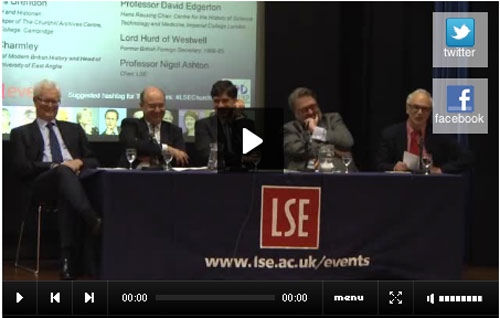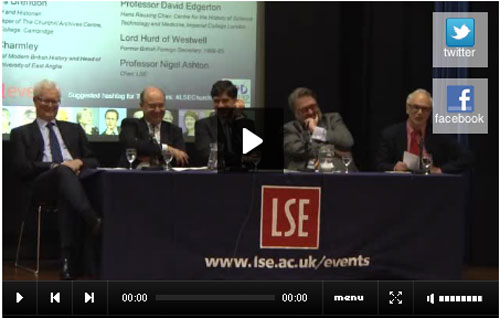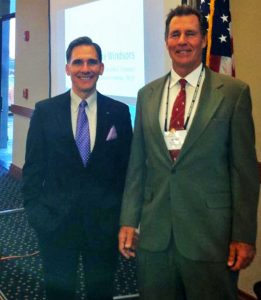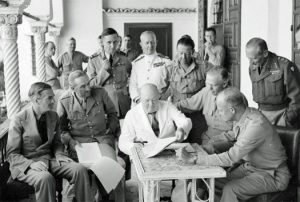
Bulletin #54 - Dec 2012
A Debate on Churchill at the London School of Economics (Watch)

December 10, 2012
Was Churchill was more of a progressive than a reactionary? Click image to watch the full debate
Click image to watch the full debate
The London School of Economics (LSE) last month hosted the Churchill Debate in association with The Churchill Centre UK. The Debate took place on 21 November in Old Theatre, Old Building at the LSE.
The participants were introduced by The Churchill Centre’s Morice Mendoza. Winston and Clementine Churchill’s daughter Lady Soames and her nephew Randolph Churchill were in attendance to watch the proceedings.
“Was Churchill was more of a progressive than a reactionary” was the motion put forth for the evening’s debate.
The panel of speakers included, Dr Piers Brendon, former Keeper of the Archives at The Churchill Archives Centre; John Charmley, professor of modern British history and head of school at the University of East Anglia; Professor David Edgerton, the Hans Rausing Chair in the centre for the History of Science Technology and Medicine, Imperial College London; and Lord Hurd of Westwell, British Foreign Secretary from 1989-95.

2025 International Churchill Conference
The Chairman of the debate was the LSE’s Professor Nigel Ashton.
Lord Hurd began the debate. “Churchill was a buccaneer… always in search of excitement. And when you’re dealing with a buccaneer you don’t get consistency,” he remarked. He emphasised that Churchill was his own man rather then clearly tied to any party. “Service, in search of excitement,” is how Lord Hurd described Churchill.
The former Foreign Minister compared Churchill to Benjamin Disraeli saying that they shared the great gift of oratory, which he commented “…doesn’t exist in the British Parliament today.”
“There was always an excitement that came through in his speeches on the radio,” Hurd said. He continued, “Churchill’s views didn’t matter that much because they were always changing.”
Churchill was a very liberal Home Secretary but after nearly twenty years switched back to the Tory Party where he began his parliamentary career.
As Home Secretary, Hurd often quoted Churchill, “The test of a nation is how it treats the people that it locks up.”
Watch the entire debate here at the LSE website
Churchill often put himself at risk, but that was his personal style.
He was a Tory at heart. Was born at Tory, but took on many liberal policies over the course of his career. He was proven to be wrong side of history of three major issues during his career; The India Bill, taking Britain back to the gold standard as Chancellor of the Exchequer, and backing Edward VIII during the abdication crisis.
He was a romantic when it came to policies like the India Bill. He was dead set it against it, but it was because he has spent time there a loved the idea of “an emperor from across the seas.”
The return to the gold standard was a disaster for Britain.
“His politics took the Tory form during parts of his career and at other times took the Liberal form,” Lord Hurd remarked, “but the key to Churchill it was that he was looking for excitement,” in politics rather firmly in the camp of either party.
“He was terribly enchanted by the monarchy,” Hurd went on, and during the abdication crisis he backed the King and tried for a compromise. “But he got in wrong.”
Professor David Edgerton said that, “Churchill was a tie-hard imperialist. He enjoyed the finer things in life on an aristocratic scale.” He remarked that he was also an intellectual, of course winning the Nobel Prize for literature in 1952.
“In mid-century Churchill led a coalition government he was certainly more of a reactionary then a progressive,” said Edgerton. The argument was made at that time that Churchill was a reactionary of the previous century and didn’t know how to fight a war in the modern time. However, in fact Churchill was very much interested in machines and wanted to fight a war with the latest technology, thanks to the help of his good friend and advisor Professor Lindemann, later Lord Cherwell.
Professor Edgerton stated that “Churchill was quite progressive in terms of war.”
He continued, “Churchill and Lindemann wanted action, initiative, creativity, individual effort, not great laboratories of tedious experts and committees.” There is a “politics of machines in Britain”.
In his politics, Churchill came to be a reactionary who was forced to make progressive policy decisions. But in relation to machines he was a progressive who often pursued reactionary policies,” Edgerton commented.
Professor John Charmley remarked “That at the time, some called him a completely reactionary figure.” He loved reading H.G. Wells and felt that that due do his optimistic liberalism that he felt machines could solve any problem.
He went on to make the point that one could argue that his initial Toryism was accidental as he was firmly a liberal; progressive by the policies he was most passionate about.
Dr Piers Brendon said that one could really argue either side of the question, but in the end it doesn’t really matter. What matter above all was the demonstrated passion of his convictions and he was the man needed to do the job when Britain was in trouble. Dr Brendon quoted Roosevelt as saying that, “Churchill is a hopeless reactionary.”
The debate seems to have settled the question once and for all; Churchill was both a progressive and a reactionary.
Subscribe
WANT MORE?
Get the Churchill Bulletin delivered to your inbox once a month.





